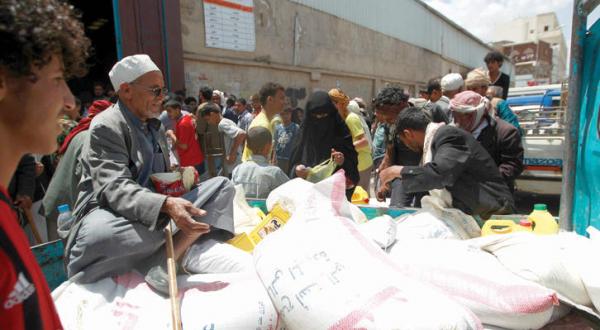Aden- Money plunder in Yemen has increased significantly, and “War expenses” is the only justification presented for large sums of money vanishing.
Informed Shi’ite sources exposed Houthi militias appropriating money dedicated to the annual Waqf (inalienable religious endowment in Islamic law), Sunni committees and Mosques.
The money is being taken away based on an Iranian fatwa (legal opinion or learned interpretation of Islamic law dispensed by a qualified jurist) which was issued in Qom during 2011. The fatwa authorizes Shi’ite people to taking over the Sunnis’ money.
Houthi plunder has affected not only Waqf assets and money, but has also gone as far as Yemeni citizen possessions. Militant insurgents continue to sack money of public and private institutions, in addition to business men and citizens.
Leaked information- obtained from Houthi sources- reveal that a fair amount of the money is being allotted to Houthi leaderships who within a year after the insurgency, suddenly joined the new money, owning assets, real estate, liquid funds and liabilities in Sana’a and northern Yemen governorates.
Large sums of money have also been run abroad.
Houthis base their actions on several religious Marja’ (authority to make legal decisions within the confines of Islamic law), as tojustify their plundering.
Former Supreme Leader of Iran Ruhollah Khomeini (a Shi’ite Marja’) had mentioned in one of his books, Tahrir al-Wasilah- a guide for Shi’ite Muslims-, in section 352/1, a cited permission for Shi’ite people to take over money of Sunni people, given they fulfill the condition on Khums .
Khums is a historically required religious obligation of Muslim army to pay one-fifth of the spoils of war to religious bodies.
Sources added that Houthi militias, who are also accused of looting charity money in Yemen, have used the Khomaini fatwa when validating the plunder. Houthis have also broken into the Central Bank of Yemen in April 2015. Houthis are said to have acquired 107 million dollars from that theft.
Insurgents later declared that the money they have raided is being devoted for popular recruitment and war expenses.
Houthis also base their actions on Zaidiyyah (Shi’ite sect) Marja’ which supports the plunder of Shafi’i (Sunni sect) people in Yemen.
The Zaidiyyah Marja’s fatwa was issued by Imam al-Mutawakkil a’la allah Ismail bin al-Qasim, and during his reign over Yemen (1644-1676 A.D.)
Observers of Yemen today compare the current state of affairs in the war-torn country to the experience Iraq had, and still is having, with Iranian- backed groups robbing national and citizens’ possessions.
Houthi violations were not restricted to money and asset plunder, insurgents have also targeted homes used to recite and teach the Holy Quran to pupils and bombarded both homes and Mosques.
People in Yemen continue to be shocked by Houthi defilements, and they emphasize that the approach taken by the insurgents is unprecedented, even during the historical sectarian conflicts Yemen endured.
Humanitarian organizations confirmed and recorded all violations Houthis have exercised against Yemeni people. Activists and humanitarian workers have pointed out that the plunders and encroachments will be presented before tribunals after the insurgency comes to an end.

